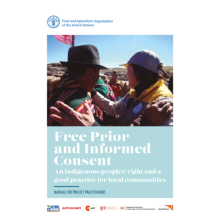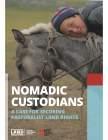Land Library
Bienvenue dans la bibliothèque du Land Portal. Explorez notre vaste collection de ressources en libre accès (plus de 74 000), comprenant des rapports, des articles scientifiques, des articles de recherche, des publications évaluées par des pairs, des documents juridiques, des vidéos et bien plus encore.
/ library resources
Showing items 1 through 9 of 14.This report consolidates findings from previous activities by FAO and other stakeholders, and identifies in the four focus countries (Ethiopia, 
Until recently, the Pokot in the highlands of the Baringo area in Kenya have practised semi-nomadic pastoralism. Today they are rapidly sedentarizing and in many areas suitable for farming, they are adopting rain-fed agriculture.
This manual is designed to assist development organizations to respect the right to FPIC when developing and implementing projects affecting Indigenous Peoples.
The technical guide on improving the governance of pastoral lands is designed for several audiences including government and non-government actors.
The goal of the Rangelands Initiative is increased tenure security of local rangeland users through improved implementation of enabling policy and legislation.
As part of the Global Call to Action in Indigenous and Community Land Rights, this brief puts the spotlight on the need to secure land rights for the world's pastoralists, as pastoralism is practised by an estimated 200-500 million people. Pastoralists manage rangelands that cover a quarter
The aim of the study was to identify potential constraints to mutual resource utilization in the bordering areas of Nyangatom and to identify and develop participatory mitigation measures to resource utilization problems based on community and government proposals.
INDEX 2.0 RECENT EVENTS 4.0 PASTORALISTS DO PLAN!
This manual of guidelines is distributed by the Ministry of Lands and Resettlement to guide Communal Area residents and land authorities about group land rights. This guidance is official. This means that advice should be followed – as relevant to the case in point.









